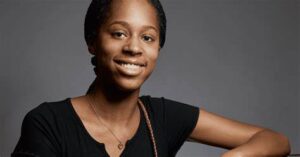Simon Hale attends a CBSO anniversary celebration.
One of the nation’s favourite pieces of music and the debut of the third-youngest of the celebrated Kanneh-Mason clan combined to draw a full house to the latest CBSO concert at Symphony Hall.
Jeneba Kanneh-Mason followed in the footsteps of her brother Sheku, who performed Dmitri Shostakovich’s First Cello Concerto with the orchestra last month, to play Sergei Rachmaninoff’s Second Piano Concerto as part of the composer’s 150th birthday celebrations.
Catapulted into the spotlight with her performance of the Florence Price Concerto on her BBC Proms debut this summer, the 20-year-old was presented with a piece the audience would have known so well given its place at the top of radio station Classic FM’s Hall of Fame and use in great film scores.

Disappointingly, Kanneh-Mason played it safe without the passion and flair you come to expect from performances of this broodingly emotional work. The tempo was frustratingly slow and the articulation between the notes underwhelmingly staccato instead of a smooth flowing legato.
No doubt a work in progress for an indisputably immense talent, Kanneh-Mason also suffered from some heavy-handed conducting by Andrew Gourlay, who allowed the orchestra to almost drown out the piano in some passages especially in the climax of the first movement and in the ‘big tune’ finale.
The concert included the first performance in Symphony Hall of a work that was both conducted and composed by Andrew Gourlay. His Parsifal Suite comprised the great orchestral set pieces from Richard Wagner’s Parsifal opera, which centres on an Arthurian knight’s long quest for the Holy Grail.
As Gourlay told the audience, the orchestral extracts in the opera do not have what sound like a conclusion, so instead of composing a piece with breaks he integrated the extracts in a different order to weave all the music together – and in what proved to be a most satisfying way.
The orchestra captured the perpetual state of yearning and anguish in this darkly beautiful and ethereal music, percolating the beautiful opening motif through to its searingly moving resolution.
Thoroughly engaging too was the performance of Samuel Coleridge-Taylor’s Ballade for Orchestra, an 11-minute opener originally commissioned for the Three Choirs Festival at Gloucester Cathedral in 1898 on the recommendation of Edward Elgar. Full of exuberant melodies, the work included a romantic passage that sounded as if it had come straight out of the Rachmaninoff scorebook, the only disappointment being that it wasn’t longer.
The CBSO will perform Johannes Brahms’ Symphony No 3. Joseph Haydn’s Symphony No 96 (Miracle) and György Ligeti’s Violin Concerto with Carol Widmann as soloist on Wednesday, November 1st at Symphony Hall.
For tickets call 0121 780 3333 or book online at cbso.co.uk
Pics – Jeneba Kanneh-Mason (this page) – John Davis. Andrew Gourlay (front) – Kaupo Kikkas.


